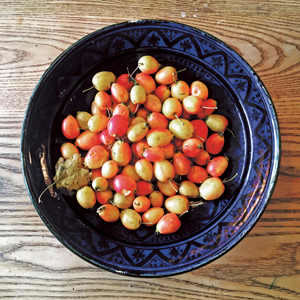I set up my wild food foraging and cookery school, Fat Hen, in 2007, having worked previously as an ecological consultant for over a decade. I was drawn to foraging because I already had skills in plant identification through my work, and cooking has always been a way in which I relax and create.
Foraging is a totally satisfying way of adding new ingredients to your repertoire. It connects you deeply to the seasons and to Nature. It’s free and it’s brilliant for your spiritual and emotional wellbeing on many levels. I find the act of foraging deeply meditative, and I love having a reason and purpose for spending time exploring the footpaths, woodlands, green lanes and beaches on my doorstep.
I am a member of the Association of Foragers (www.foragers-association.org.uk), an international member-based organisation set up to promote and support the sustainable harvesting and use of wild foods. We abide by principles that respect all species and habitats and we promote sustainable practices and ecological stewardship. Through teaching we aim to encourage the rewilding of people so that we once again become a part of Nature as opposed to apart from Nature.
If you are just starting out on your foraging journey, I advise only eating plants that you have 100% positive identification for. It is always best to be humble and admit that you only know what you know rather than take chances that could prove injurious to yourself and others.
Start with common and easy to identify wild foods such as nettles, ramsons, elderflower, blackberries. It’s the thrill of finding something and making something delicious out of it that kick-starts you on the road to foraging.
Foraging is a lifelong journey of discovery. There are endless recipes and ways of utilising different parts of the plant, from roots to leaves, to stems, to flowers, to seeds.
My top tips:
1. Ensure that you don’t trespass to find wild food.
2. Don’t forage alongside busy roads, as exhaust fumes can contaminate roadside plants with heavy metals.
3. To avoid pesticides and herbicides, make sure that you know how fields are managed before you forage around their edges.
4. If foraging in rivers or coastal areas, find out what you can about the water quality from the Environment Agency website and your local water authority. Avoid polluted streams and sewage outfalls.
5. Be careful with waterside plants (such as watercress), as they can be infected with liver fluke. Don’t eat them raw.
6. Don’t pick in rivers and coastal areas after big storms. Run-off from fields and overflowing sewers will be flowing into rivers and onto beaches.
7. Be aware that slow-flowing and stagnant water bodies and canals can be the source of Weil’s disease (leptospirosis), a potentially fatal bacterial infection. The bacteria can be carried in rat urine and can enter the body through cuts or abrasions or through swallowing contaminated water. This is rare, but it is still a possible problem on inland waterways.
8. Never take any chances with plant or fungus identification – only eat things you are 100% sure of.
Here’s a simple autumn hedgerow recipe. Crab apples are often ignored, as people aren’t sure what to do with them. They are great as an ingredient in a hedgerow jelly, but pickling them whole in sweet and spicy vinegar is wonderful.
Pickled crab apples
Makes 2 large jars.
300ml organic apple cider vinegar
400g sugar or an alternative vegan sweet syrup such as agave or brown rice syrup
25g fresh root ginger, bruised
5cm piece of cinnamon stick
1 tsp whole cloves
1 tsp allspice berries
1kg crab apples with stalks
Put the vinegar, sugar, ginger, cinnamon, cloves and allspice berries in a large pan over a low heat, stirring until the sugar has dissolved, and then bring to the boil. Turn down the heat to a simmer.
Keeping the crab apples whole and with stalks attached, add them to the hot vinegar. Simmer very gently until they are tender but not too soft (approximately 3–5 minutes). Make sure you remove them before they split. Remove them with a slotted spoon and pack them into warm, sterilised jars.
Bring the spicy vinegar syrup back to the boil and boil it for 5 minutes. Strain it over the apples. Cover the jars with vinegar-proof lids.
You can eat these straight away, but they are better if you leave them for a few weeks so that all the flavours can infuse into the apples. Consume within a year.








